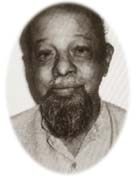The candles are dimmed...an era draws to a close
BY AFREEHA Jawad
IT was a beautiful way of remembering the late Regi Siriwardena -
journalist, poet, thinker and scholar. However, the ICES may have done
one better had it started the programme earlier.

Remarkable indeed was the remembrance of Siriwardena when his own
tribe failed to do so for he was first a journalist and remained so for
quite a long period - more than ten years - before he moved into
scholarly environs.
The elegance and simplicity in the decor meticulously attended to,
should not have missed any aesthetic eye.
The myriad tiny bulbs neatly fixed on to a canopy of white cloth
bordered in green scallops that was to be the small assembly's shelter,
the numerous candle stands on all sides assuring light in case of some
eventuality, voiced the occasion's dignity and solemnity.
Cascades of pleated white satin coming off the white canopy were
neatly tied up at mid point which interception broke the monotony of an
otherwise plain white flow on all sides. Placed on a side was
Siriwardena's portrait itself highlighted by flickering candles.
Adding to all such dignity and poise were the piano and cello
recitals by Soundarie David and Tamara Holsinger, whose renditions from
Faure and Bach not to forget Dilrukshi Fernando's scintillating singing
cutting through the stilled darkness certainly did Siriwardena proud
though shrouded in invisibility.
Many did not even mind going through the nearly three hour program
despite seat shortage - perhaps symbolic of the high regard and
affection they had for him which on occasions otherwise may have invited
kicking of many heels.
Dr. Radhika Coomaraswamy, chairperson, ICES, referring to the late
writer as openly political and deeply spiritual said his ascetic
lifestyle was a manifestation of his identification with the
marginalized.
Espousing the cause of social justice he denounced peripheral
existence, majoritarianism and hated hypocrisy. He was a part of a
bilingual generation.
While being one of the era's great nationalists he also was tormented
by a strong sense of universalism.
Tempered by Marxism's intellectual tradition he would discuss,cajole
and even provoke the young to think differently. He lived simple. Books
and music were his luxuries which was why a musical tribute was
arranged.
Coomaraswamy even affectionately recalled how the late Siriwardena
while on official trips would break into verse at lakes and reservoirs.
She also reminisced how he made ICES a special place to look for new
answers to life.
Godfrey Gunatilleke saw in Siriwardena an unconventional personality
whose main interest was the expression of what lay deepest in him.
Siriwardena approached literature as a world of knowledge and deep in
human experiences of which he went right into the centre. Philosophy to
him was illusion and poetry real.
As a believer in the human condition being tragic, his spirituality
came off in his poetry, writings and drama. Siriwardena's uniqueness was
in the 1940s period with eroding values, which time he saw as the second
coming of Yeats. The Trotskyites' corruption of power appealed to him
very much.
Gunatilleke also observed Siriwardena's uniqueness to be derived from
his experiences. He also recalled him to be a brilliant undergraduate of
the University's English Department when Gunatilleke entered its
precincts.
Remarkable was how he balanced disbelief, conviction and passion.
Tissa Abeysekera remembering Siriwardena referred to his public image
that did not correspond to his towering genius. The most profound things
he would express in simple terms.
Erudition looked common sense to him. An enigma Abeysekera noted in
Siriwardena was the interest with which he learnt French and Russian
over his own mother tongue which when questioned the reply was, "its a
waste of time".
Abeysekera probing further said he had a clue to Siriwardena's
inhibition and recited the 'Colonial Cameo' where he speaks of himself
as a product of a father whose hero was Napoleon and a mother that knew
not the superior tongue.
She once had entered the classroom and upon leaving it after meeting
the teacher had said; "Gihin Ennan", whereupon the boys came sniggering
and shouted "gihin waren".
"Those snobbish little bastards" says Siriwardena in his Colonial
Cameo. "I was ashamed of my mother" he continues and now "I'm ashamed of
that shame".
Continuing Abeysekera said that wherever they may be "those snobbish
little bastards", it was that mother who produced the English scholar
that was Regi. |




